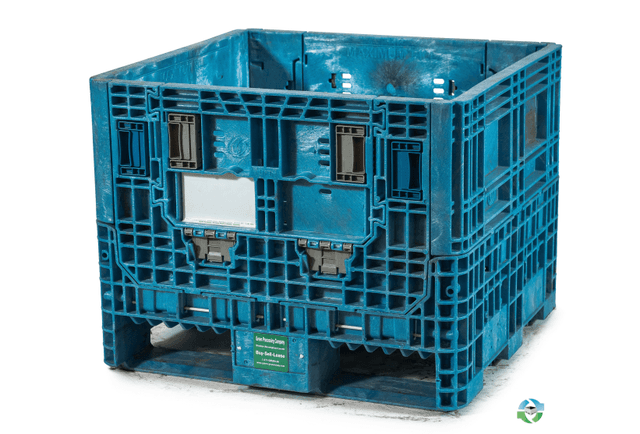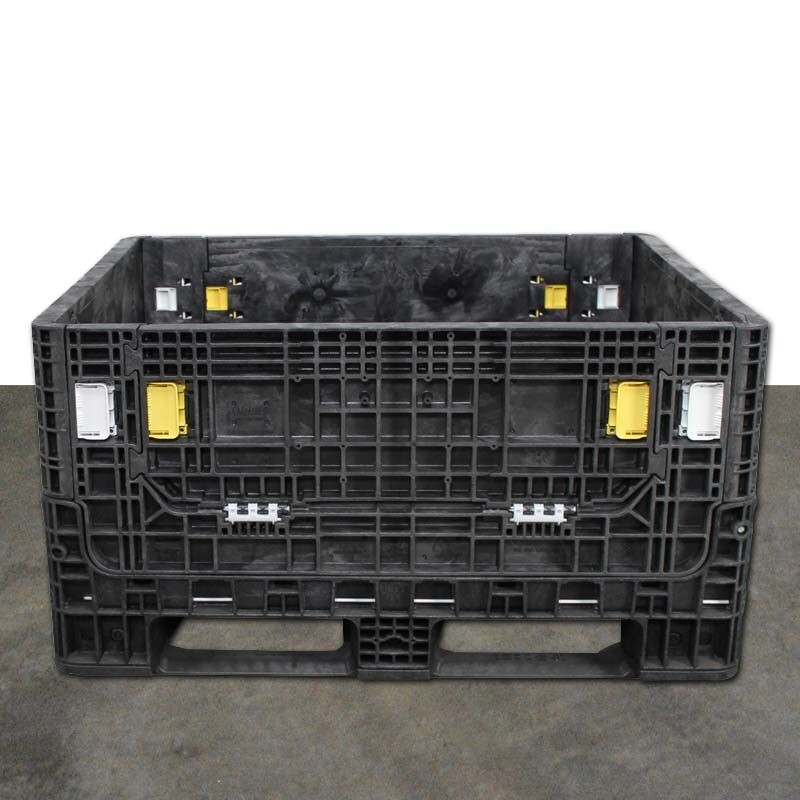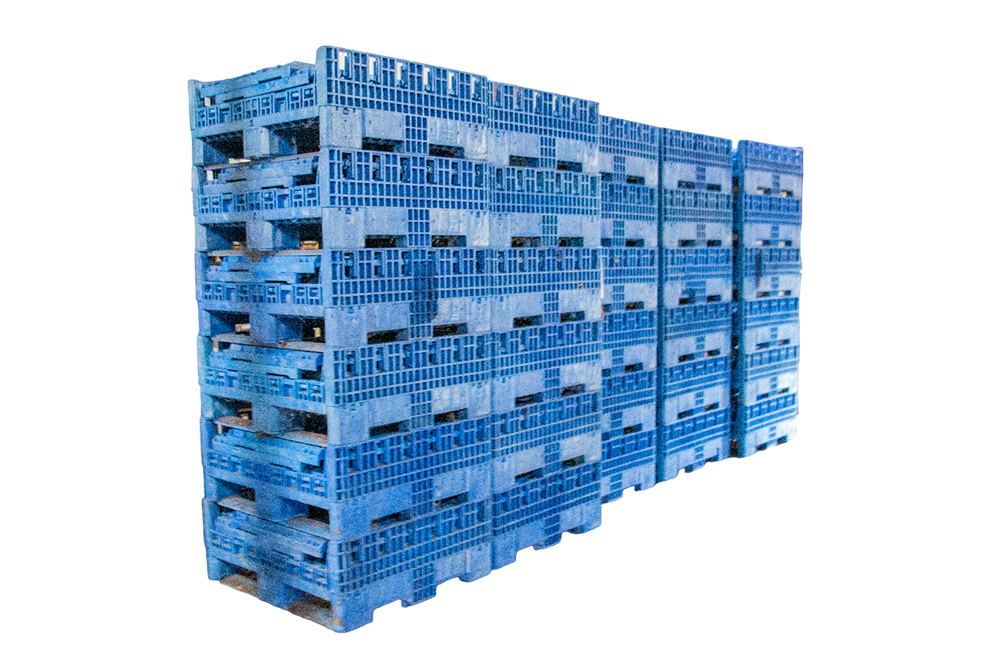Why Bulk Containers Are Essential for Lasting and Cost-Effective Transportation
Bulk containers play a crucial role in modern-day logistics. They promote the effective activity of large amounts of items, consequently maximizing transport procedures. This method not only decreases expenses yet also decreases environmental effect with lower exhausts and waste generation. As industries look for even more sustainable methods, the adoption of mass containers is ending up being progressively significant. What ramifications does this change hold for future logistics and supply chain management?

The Benefits of Making Use Of Mass Containers in Logistics
Mass containers transform logistics by enhancing efficiency and sustainability. These containers permit the transport of big amounts of products in a solitary journey, considerably minimizing the variety of journeys called for. This not only simplifies procedures but additionally minimizes labor expenses connected with handling, packing, and unloading. On top of that, bulk containers are developed to enhance area use within transport automobiles, making sure that more products can be shipped concurrently.
The standardization of bulk containers likewise simplifies the logistics process. With consistent dimensions, they can be conveniently stacked and stored, leading to improved storehouse administration. Bulk containers typically feature durable materials that secure materials from damage during transportation, therefore reducing item loss and boosting general integrity. As a result, businesses can experience improved supply chain efficiency, eventually leading to enhanced productivity and consumer complete satisfaction. This combination of aspects makes mass containers a crucial property in modern-day logistics.
Ecological Effect: Reducing Waste and Carbon Footprint
As sectors increasingly prioritize sustainability, the adoption of bulk containers has actually arised as a vital technique for reducing waste and lowering carbon footprints. These containers minimize using packaging products, such as boxes and plastic, thus significantly lowering overall waste generation. By combining deliveries, bulk containers boost transportation efficiency, permitting even more items to be moved per trip. This decrease in trips straight associates with lower greenhouse gas discharges, adding to a smaller sized carbon impact.
Furthermore, mass containers can often be reused or reused, additionally mitigating environmental impact. The durability of these containers warranties they can endure several transport cycles, decreasing the need for single-use choices. refurbished bulk containers. By improving logistics and advertising efficient source usage, mass containers not just sustain sustainable techniques however additionally encourage industries to line up with global ecological goals. Inevitably, their execution shows a dedication to eco-friendly stewardship and liable source monitoring
Price Cost Savings: Just How Mass Containers Lower Transport Expenses
While several firms look for methods to enhance their bottom line, using bulk containers provides a significant possibility for reducing transport costs. Bulk containers optimize the volume of products transferred, permitting businesses to deliver larger amounts at the same time. This effectiveness lowers the number of trips called for, directly reducing fuel costs and decreasing labor costs connected with loading and discharging.
Additionally, bulk containers frequently feature structured layouts that maximize room use within transport lorries. This suggests fewer voids, causing more effective use readily available ability. Moreover, the toughness of bulk containers can reduce the threat of product damage throughout transportation, ensuring and lowering losses that even more products arrive undamaged.
Enhancing Supply Chain Performance With Bulk Storage Solutions
Mass storage solutions play a crucial duty in enhancing supply chain effectiveness by optimizing supply monitoring. By combining goods into fewer, bigger containers, businesses can considerably lower taking care of expenses linked with constant transfers and processing. This structured approach permits much better monitoring and administration of stock, ultimately leading to boosted operational performance.
Streamlined Supply Monitoring
Efficient stock management is necessary for optimizing supply chain procedures, particularly when organizations take on bulk storage space options. These services enable businesses to maintain higher supply levels while decreasing the frequency of replenishment. By consolidating products right into bulk containers, firms can simplify their inventory processes, reducing the intricacy related to tracking several smaller sized bundles. This strategy assists in precise inventory counts and enhances forecasting accuracy, enabling for even more informed decision-making. Furthermore, bulk storage space options streamline storehouse organization, making it less complicated to situate and gain access to products when required. As a result, companies can accomplish a much more effective supply turnover rate, inevitably improving general supply chain performance and lowering the chance of stockouts or overstock scenarios.

Reduced Handling Expenses
The implementation of mass storage solutions not just simplifies stock administration yet additionally significantly reduces dealing with prices across the supply chain. By consolidating products right into bulk containers, companies reduce the requirement for regular handling and transfer in between various storage and transportation units. This technique lowers labor expenses connected with loading, dumping, and moving smaller sized bundles. In addition, mass storage space reduces the frequency of shipments, leading to lower transport costs and reduced gas consumption. Therefore, companies can optimize their logistics procedures, permitting an extra reliable allotment of resources. Inevitably, minimized dealing with prices contribute to enhanced general supply chain efficiency, fostering an atmosphere that sustains both sustainability and economic viability.

Convenience of Mass Containers Across Numerous Industries
Several sectors have distinctive demands for transport and storage space, mass containers have actually emerged as a flexible remedy that fulfills a broad variety of requirements. These containers, varying from huge bins to specialized storage tanks, can fit varied products, including granules, liquids, and powders. In the farming market, bulk containers help with the transport of fertilizers and grains, while the food and drink market uses them for ingredients and ended up products. The chemical industry depends on bulk containers for securely transporting harmful materials, ensuring compliance with safety and security policies. Additionally, building and construction firms take advantage of mass containers for transporting aggregates and other materials. Their adaptability expands to various modes of transportation, including trucks, ships, and trains, enhancing logistical effectiveness. This adaptability not just enhances operations throughout different sectors however also advertises sustainability by minimizing packaging waste and optimizing area en route. For that reason, mass containers play an important function in contemporary supply chain administration.
Future Trends in Bulk Container Use and Sustainability
The future of bulk container usage is significantly shaped by cutting-edge materials development that improves sustainability. In addition, automation in logistics assures to streamline operations, decreasing waste and improving performance. Accepting round economy methods will certainly additionally reinvent how bulk containers are made, made use of, and recycled, fostering an extra sustainable transportation landscape.
Ingenious Materials Growth
As markets progressively focus on sustainability, cutting-edge products growth in mass containers becomes a substantial element in enhancing green transport remedies. Researchers and manufacturers are checking out eco-friendly plastics, recycled compounds, and lightweight steels to minimize environmental effect. These products not just minimize waste yet likewise enhance gas performance by decreasing the total weight of containers. Additionally, developments in smart products, which can adapt to differing conditions, improve the durability and performance of mass containers. The integration of these innovative materials lines up with round economic climate concepts, advertising reuse and recycling. As the demand for sustainable methods grows, the development of such materials will play a crucial function in shaping the future of mass container usage in logistics and transport.
Automation in Logistics
Considerable innovations in automation are poised to change logistics and the usage of bulk containers, improving sustainability in transportation. Automated systems, consisting of drones and self-governing automobiles, are streamlining the movement of mass containers, lowering the dependence on standard fuel-powered transportation. These innovations enhance transmitting and filling processes, enhancing and minimizing empty miles gas performance. In addition, automated inventory administration systems boost monitoring and tracking of mass containers, making sure better resource allocation and minimized waste. The combination of the Internet of Points (IoT) enables real-time data analysis, enabling positive decision-making that aligns with sustainability goals. As automation continues to progress, it is anticipated to drive further innovations in bulk container use, eventually sustaining even more sustainable logistics methods and decreasing the ecological impact of transportation.
Round Economic Situation Practices
Developments in automation are establishing the stage for a much more incorporated method to round economy practices in the domain name of bulk container use. As sectors significantly embrace sustainability, mass containers are being designed for longevity and reusability. This change not only lessens waste however likewise improves resource effectiveness. Companies are adopting approaches such as closed-loop systems, where utilized containers are accumulated, reconditioned, and reestablished into the supply chain. In addition, clever innovations track container life cycles, promoting better monitoring and reducing environmental impact. The cooperation between makers, logistics companies, and end-users is necessary in developing requirements for lasting container use. used bulk containers. Future patterns suggest a growing emphasis on materials that are eco-friendly and recyclable, additional reinforcing the round economy's principles wholesale transportation

Regularly Asked Concerns
What Materials Are Bulk Containers Generally Made From?
Bulk containers are generally constructed from sturdy products such as high-density polyethylene, steel, aluminum, and cardboard. These products offer strength, defense, and flexibility, making them ideal for transporting numerous products in different markets successfully.
Exactly how Do I Choose the Right Size Mass Container?
Choosing the right size mass container includes reviewing the volume of materials to be transported, considering managing tools compatibility, and appraising storage area demands. Correct size warranties effectiveness in transport and lessens waste throughout delivery.
Are Bulk Containers Reusable or Recyclable?
Bulk containers are typically multiple-use, made for several trips, improving sustainability. Lots of can additionally be recycled, relying on the products made used plastic containers use of. Picking recyclable alternatives even more decreases and sustains ecological goals waste in transportation techniques.
What Safety Laws Put On Bulk Container Transportation?
Safety regulations for bulk container transportation include conformity with the Department of Transport standards, appropriate labeling of dangerous products, architectural integrity assessments, and adherence to weight restrictions to ensure safe handling and avoid accidents throughout transit.
Just How Can Companies Shift to Utilizing Mass Containers Successfully?
Companies can transform to bulk containers by examining existing logistics, educating personnel on handling, purchasing ideal equipment, optimizing inventory management, and collaborating with suppliers to ensure compatibility and performance throughout the supply chain.
As sectors increasingly prioritize sustainability, the fostering of bulk containers has arised as a key approach for decreasing waste and lowering carbon footprints. By settling products into bulk containers, firms can streamline their inventory procedures, minimizing the intricacy associated with tracking numerous smaller sized packages. As sectors progressively prioritize sustainability, ingenious products growth in bulk containers arises as a considerable factor in boosting environment-friendly transport solutions. Automated systems, including drones and autonomous vehicles, are streamlining the motion of bulk containers, lowering the dependence on standard fuel-powered transportation. In addition, automated supply monitoring systems boost monitoring and surveillance of mass containers, ensuring far better source appropriation and lowered waste.